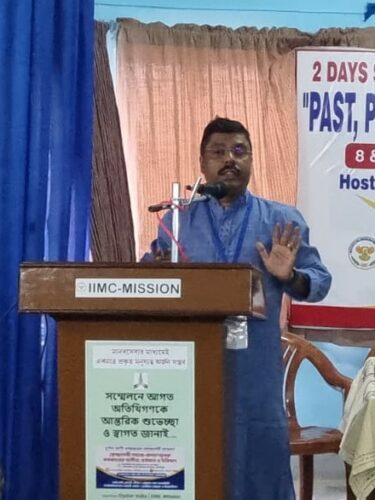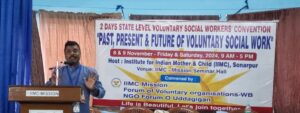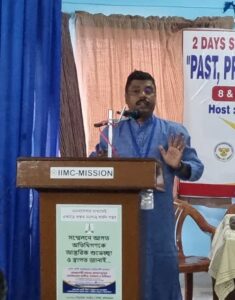

Mukti’s President, Mr. Sankar Halder’s Speech at the State-level Conference of Voluntary Social Workers
On November 9, 2024, the Indian Institute for Mother and Child organized a state-level conference for voluntary social workers. The event was graced by Mr. Sankar Halder, President of Mukti, as well as representatives from other organizations involved in social work. During the event, Mr. Halder delivered a speech on the theme of the conference, “Past, Present, and Future of Voluntary Social Work.” His thoughts and ideas were well received by the audience. One of the key objectives of the event was to explore ways to strengthen the acceptance of social workers in broader social contexts and create a roadmap for the future. At the outset, Mr. Halder conveyed his regards to the participants, including Dr. Sujit Brahmachari, the founder of the Indian Institute for Mother and Child.
 In the first part of his speech, he referred to the political philosophies of great philosophers such as Socrates, Plato, and Aristotle to highlight the significance of the thinkers of the society. He explained the varied levels of consciousness among people in society. He used the analogy of a pyramid to describe these varying levels. People at the bottom of the pyramid, struggling to meet basic needs like food, clothing, and shelter, often have little opportunity for intellectual development. On the other hand, those not struggling for survival often have more opportunities for intellectual and philosophical growth. This discrepancy in awareness creates a gap where people find it difficult to understand one another, leading to a lack of comprehension even of the thoughts of great minds like Rabindranath Tagore or Galileo. He reflected on the contributions of the revered Bengali social reformer Ishwar Chandra Vidyasagar, whose family failed to appreciate his reformist ideas, and on how he spent the last few years in seclusion, away from them.
In the first part of his speech, he referred to the political philosophies of great philosophers such as Socrates, Plato, and Aristotle to highlight the significance of the thinkers of the society. He explained the varied levels of consciousness among people in society. He used the analogy of a pyramid to describe these varying levels. People at the bottom of the pyramid, struggling to meet basic needs like food, clothing, and shelter, often have little opportunity for intellectual development. On the other hand, those not struggling for survival often have more opportunities for intellectual and philosophical growth. This discrepancy in awareness creates a gap where people find it difficult to understand one another, leading to a lack of comprehension even of the thoughts of great minds like Rabindranath Tagore or Galileo. He reflected on the contributions of the revered Bengali social reformer Ishwar Chandra Vidyasagar, whose family failed to appreciate his reformist ideas, and on how he spent the last few years in seclusion, away from them.
It is not difficult to comprehend that the majority of society remains deprived of intellectual consciousness. They can easily understand and accept the language of people with average intellect—the language of those who lead at various social levels. Mr. Halder emphasized that this difference, arising from variations in intellectual levels, has always existed and continues to impact democratic systems. He reminded social workers that the present society may not immediately understand their visionary ideas, much like how Socrates was executed by his contemporary society. He noted that it may take 400-500 years for future generations to fully appreciate the efforts of social workers like them. Thus, he advised social workers to not expect immediate recognition and to accept that society might not appreciate their work right away.
Mr. Halder then pointed out that many social movements today are often exploited for personal interests, citing the tragic incident of the brutal rape and murder of a young doctor at RG Kar Medical College on August 7, 2024. While there have been massive protests and widespread participation, few have truly bothered to examine the root causes or make any significant effort to find a long-term solution. He highlighted that social movements like these often fail to bring about lasting change if they are merely reactive. He quoted a poem to illustrate how people often mistake short-term protests for real solutions.
বক্তৃতা দিয়া, মিছিল করিয়া, ধূলা উড়াইয়া ভাবি
তুফান উঠেছে
এইবার মিটিবে যত বিপ্লবী দাবী
কিন্তু তুফান ওঠে না, ওঠে ধুলি ঝড়
পথের পাথর তেমনই পড়িয়া রয়
বাঁকা তলোয়ার, বাঁকা চোখে হাঁসে
তেমনই পথের পাশে
The problems of our society are like a heavy boulder, which cannot be solved in the long term just by movement. We, who are social workers, may think that after taking some initiative, we will solve big problems, but when it doesn’t happen, we often become disappointed.
We, who lead the work of societal improvement, need to realize this reality.
Those of us who are bound by our political inclinations or other commitments, which we believe to be unavoidable, should never shy away from raising our voices against injustice or wrongdoing. We may be among the fortunate few who have had the opportunity to sharpen our intellectual abilities, using them to earn a living and gain economically. However, we often fail to question the flaws of the social system with our sharpened intellect, as we benefit from this flawed system, which we conveniently overlook.
When we seek recognition from society, have we ever realized whom we are expecting to recognize us? The majority of society remains trapped in the darkness of ignorance, while some are striving to dispel this darkness and attain true consciousness. Given this, does it really matter if we receive appreciation or recognition from such a society? This is something we all need to reflect on.
As we know, our inner selves are nothing but split personalities, a combination of good and evil. The evil that dwells within us is sometimes exposed, revealing its ugly face and claws, seeking to harm others in our inherent attempt to achieve selfish goals. However, the good part strives to rise above, guiding us toward empathy, kindness, and selflessness. It is through this constant battle between our darker impulses and higher virtues that we shape the essence of who we are. As the great poet and philosopher Rabindranath Tagore said, this tussle continues, as we attempt to suppress the stinking corpse buried beneath a well-decorated grave. We must suppress that evil, keeping it buried deep, and strive to overcome the negativity within us by embracing the goodness and humanity we possess.
We say, we are doing selfless work. In reality, all have our own interests involved, we just try to conceal. A monk is as greedy as a businessman. The businessman is greedy for money, and the monk is greedy for Moksha. One works for the greed of money, the other practices for the greed of Moksha. Both are involved in the game of profit and loss.
Those who practice Tantra often do not hesitate to offer human sacrifices for their success. Those of us working in the realm of consciousness believe that our work and our knowledge guide us, but we are all essentially searching for permanence. And when permanence becomes great, it achieves immortality. Every living being, every creature is in search of permanence. No one is satisfied with the idea of being dissolved into oblivion after death. Similarly, we, as social workers, have a desire to be remembered—forever—through our work in society. We are doing this work not for recognition, awards, money, jobs, or projects. If we come to this clarity of thought, the chances of unnecessary expectations and the resulting disappointments will diminish.
Makeup can transform someone into an actor, but it cannot turn someone into a leader. A humble and selfless leader seeks nothing. They do not crave accolades or victory chants. Instead, they serve the country like a friend. That is the essence of true leadership.
মেকআপ করিয়া অভিনেতা হওয়া যায়,
নেতা নাহি হওয়া যায়।
নিরহঙ্কার নির্লোভ নেতা
সে কোন কিছু নাহি চায়
অভিনন্দন মালা চায়না কো সে, চায়না জয়ধ্বনি
বন্ধুর মত দেশ সেবা করে যায়
তাহারে যেন নেতা বলি
This quote brings up the idea of equality and brotherhood, which was discussed earlier by the founder-secretary of “Vivek Path,” Mr. Samar Kumar Das.
We, social workers must believe in these values and lead the work of society, where no power relations will exist between us and the people. If we wish to see ourselves in positions of leadership, we must walk with this ideal. We, social workers can compare ourselves to the seas of sorrow.
We should strive to become seas of sorrow ourselves, so that those drowning in the world of sorrow may run toward us, and we can absorb their grief. If we present ourselves as richer, wiser, or happier than others, those who are downtrodden and burdened with grief and pain will never approach us.
Our heart is like a mirror. What we perceive and reflect is the product of our inner thoughts. The boundless generosity of Maa Sarada’s consciousness is reflected in her words – “I am the mother of the honest, and the mother of the dishonest.”
When we look at a problem from a holistic perspective, we will see that someone, in some way, has contributed to our work. Therefore, to reach this holistic mind-set, we must realize that what seems to be an obstacle is actually purifying and improving our work. We need to rise to this level of thinking, otherwise, it will remain an obstacle in social service.
There are three stages in social work. Initially, critics will jeer at our thoughts and stances as the level of our consciousness will remain elevated with respect to people around us, so our actions may seem out of place and bordering on the lines of madness. When they can’t stop us with such jeering and mocking, they will try to oppose our path. However eventually there will be transformation and the same people will recognize our work. Each of us must go through these three stages.
If no obstacles come our way, it might mean we are walking the wrong path. Any difficult task requires encountering obstacles. Social workers should not be afraid of problems. Converting problems into solutions is the very task of a social worker. When problems arise, we should be encouraged to take action. We will make our lives meaningful by solving problems and advancing toward the fulfilment of our life’s purpose.
We remember Subhash Chandra Bose and Mahatma Gandhi as great figures for their contributions towards the independence movement. They broke a 250-year-old colonial system and showed a new direction. They are all great because they took initiatives to solve significant problems. If we manage to solve a starving person’s hunger for one day, that person might remember us as a good person. However if we wish to target a bigger problem, we will be doing something significant. We must decide the magnitude of a problem, try and set higher goals and that will determine the size of the social worker we are.
Our conference today discusses the past, present, and future of social service. The past is vast; we can consider the entire span of 5000 years as our past that rolls down till yesterday. But if we look at the intermediary time, we will see a certain trend in social work, which continues today and will continue in the future.
When civilization and society were forming in the past, philosophers and social workers developed theories and philosophies that helped society move forward. People like Jesus Christ and Buddha made their contributions. Looking at the present, philosophy seems to be a dying subject. New philosophical ideas are no longer emerging. While Indian society was originally based on Vedic teachings, it was largely replaced during Buddha’s time. The theory of Advaita Vedanta became prominent during the time of Shankaracharya. Yet, new philosophical systems have not
emerged much. We have seen changes from monarchies to feudal systems, and now to democracies. We can also see how democracy is losing its identity due to the influence of various political ideologies. Now, social workers might be working, perhaps aligned with political parties, and deriving their livelihood from these engagements. But the Indian society has not yet reached that level. If we look at Western countries, they have managed to develop their ideas much further. In our country, if someone chooses a luxurious lifestyle while doing social work, they are criticized. Therefore, if we can consciously separate our livelihood from our social work, we will gain the respect we seek from society. Currently, mixing our livelihood with social service could prove harmful. So, I urge everyone to be aware of this. Looking at the current speed of civilization and technology, we see that over time, machines and technology will gradually take away our jobs. It is predicted that in the next 100 years, only 20% of people will have jobs, and 80% will be replaced by machines. This change can be seen as either positive or negative, depending on how we perceive it. But in the end, it will provide people with the opportunity to explore the world of consciousness.
In the past, those who didn’t need to work for a livelihood, who focused on spiritual practice, experienced immense growth in their consciousness. The rest, who struggled for their daily needs, missed out on this growth. However, in the future, society will be able to fulfil the needs of those people, and we, who are fortunate to be able to think and take actions for the betterment of the society by virtue of our elevated thinking ability and practice will be in a better position to support the society.
To conclude, he shares a portion of Rabindranath’s poem:
তোর আপনজনে ছাড়বে তোরে
তাই বলে ভাবনা করা চলবে না
ও তোর আশালতা পড়বে ছিঁড়ে
হয়তো রে ফল ফলবে না
আসবে পথে আঁধার নেমে
তাই বলে কি তুই রইবি থেমে?
ও তুই বারে বারে জ্বালবি বাতি,
হয়তো বাতি জ্বলবে না
In these last two lines, he reflects his thoughts: “You will keep lighting the lamp again and again, otherwise, the lamp will never get lit.”
We should not be discouraged, thinking the lamp might never get lit. We should continue to strive with the hope that, after many efforts, the lamp will surely get lit one day. Each social worker must accept that their family, their close ones, or their organization may not understand them. Accepting this truth, they must continue their journey forward. We must always keep trying, and one day, the door will open.
Mr. Halder concludes his speech with this powerful message of hope, leaving the audience inspired and uplifted.
Project Activities
- A village for independent and enterprising women (A VIEW) (5)
- About Mukti (5)
- Accreditation (14)
- AGM (64)
- Agriculture Reforms (121)
- Ambulance Service (2)
- Amplifying Community Voices (57)
- Awards (14)
- Awareness and Empowerment (125)
- Awareness drives (51)
- Bio-Village-Kankandighi (10)
- Careers (9)
- Chick Rearing Programme for Marginalised Women (16)
- Climate Resilience River Embankment (46)
- Covid-19 (74)
- Cultural Shows (6)
- Cyclone Aila (12)
- Cyclone Aila (1)
- Cyclone Amphan (44)
- Cyclone Bulbul (30)
- Cyclone Dana (3)
- Cyclone Remal (12)
- Cyclone Response & Recovery (90)
- Cyclone Tolerant Houses (15)
- Cyclone Yaas (57)
- Disaster Recovery (263)
- Editorial (41)
- Editorial by Abir Biswas (1)
- Editorial by Amit Kumar Dey (1)
- Editorial by Ankita Kothiyal (2)
- Editorial by Debabrata Halder (1)
- Editorial by Dr. Alokananda Ghosh Sengupta (2)
- Editorial by Kasturi Bakshi (1)
- Editorial by Monami Mitra (1)
- Editorial by Nandita (2)
- Editorial by Prof. Pradeep Ray (1)
- Editorial by Ranitendranath Tagore (1)
- Editorial by Sankar Halder (15)
- Editorial by Satyajit Ray (7)
- Editorial by Sohini Mehta (1)
- Editorial by Sonamon Basu (1)
- Editorial by Soumitra Bose (1)
- Editorial by Subhankar Basu (1)
- Editorial by Supriyo Banerjee (1)
- Editorial by Ujjwal Maity (1)
- Education and Enrichment (370)
- Environment and Resilience (122)
- Featured Activities (20)
- Gram Clinic (9)
- Health Water & Sanitation (84)
- HOPE (10)
- Impact Stories List (109)
- Integrated Development (188)
- Jal hi Kal (6)
- Kitchen Gardening (16)
- Livelihood & Enablement (205)
- MCDF (118)
- Medical Camp (38)
- MIT (9)
- MKSS (40)
- MSS (130)
- Mukti Academy (2)
- Mukti Craft (17)
- Mukti Cultural (2)
- Mukti Employment Exchange (MEE) (9)
- Mukti Fresh (15)
- Mukti Gram - Egra (10)
- Mukti Gram - Purbashridharpur (169)
- Mukti Green Defense in Sundarbans (11)
- Mukti Yoga (12)
- Mukto Dhara (2)
- Obituary (6)
- Observance Days Celebration (52)
- Organic Farming & Training Support (44)
- Pond Rejuvenation (18)
- Prerna (4)
- Projects For Mukti Wide (3)
- Rights and Special Needs (103)
- Run for Cause (13)
- Run4SafeFood (2)
- SDF (6)
- Shahoshini (9)
- Skill & Enterprise Development (21)
- Smart lab (5)
- Social Stock Exchange (2)
- Social Workers' Convention (1)
- Sundarbans Green (SUN-G) (15)
- Sunderban development fair project (4)
- Surya (4)
- Sustainable Agriculture Movement (61)
- SWAS-2-0 (8)
- SwasthoSongini (24)
- Swavalamban Accelerator in Sundarbans (SWAS) (21)
- Tour for Cause (45)
- TSS (178)
- UDAAN (4)
- Uncategorized (96)
- Value Education (12)
- Valued Partners (3)
- Vocational Trainings (15)
- VOICE (14)